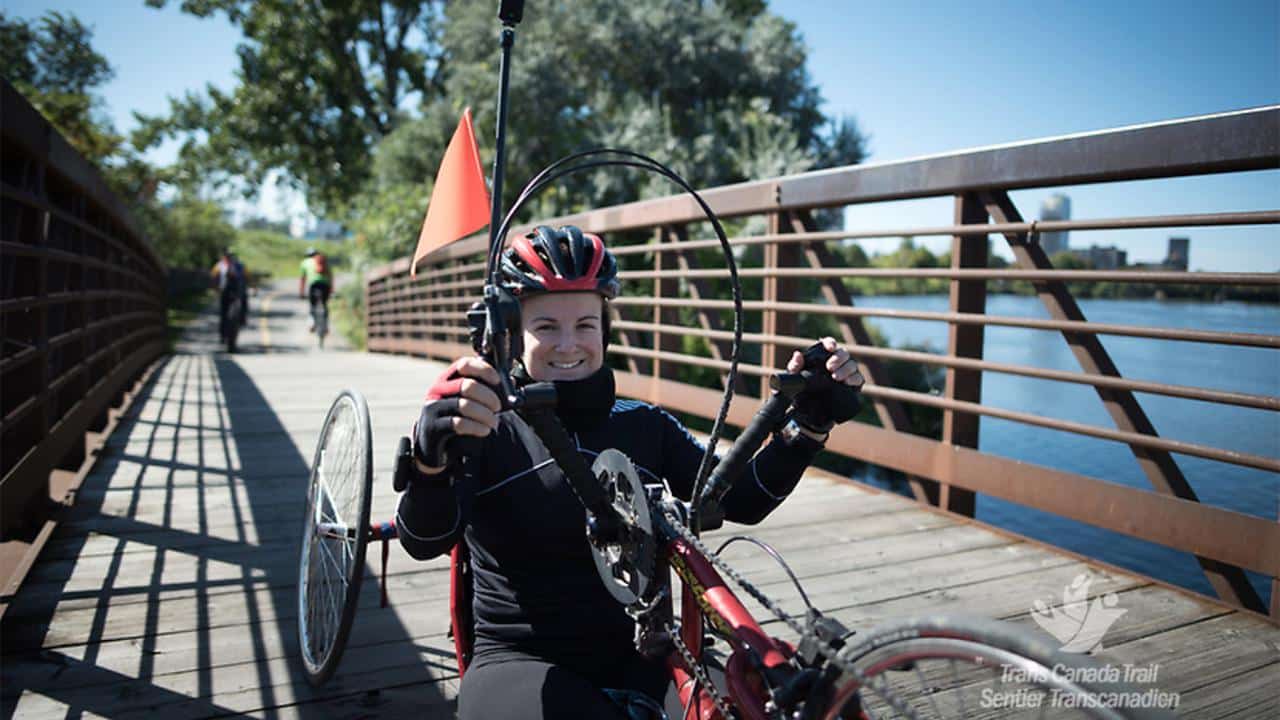
New Partnership Makes World’s Longest Hiking Trail More Accessible

Trans Canada Trail and AccessNow partnership for AccessOutdoors / Trails for All project. Mapping day on Capital Pathway in Ottawa, Ontario with Camille Bérubé. Daniel Baylis
The Great Trail in Canada is recognized as the world’s longest recreational trail for hiking, biking, and cross-country skiing. Created by the Trans Canada Trail (TCT) and various partners, The Great Trail consists of a series of smaller, interconnected routes that stretch from St. John’s to Vancouver and even into the Yukon and Northwest Territories. It took nearly 25 years to connect the 27,000 kilometers of greenway in ways that were safe and accessible to hikers. Now, thanks to a new partnership with the Canadian Paralympic Committee and AccessNow, the TCT is increasing accessibility throughout The Great Trail for people with disabilities.
Since The Great Trail opened in 2017, the TCT has worked hard to provide as much information about the greenway to Canadians across the country. By working with the individual parks and trail groups that make up The Great Trail, they have created an experience that outdoorsmen from all over Canada can enjoy. However, until recently, little information was given for accessibility to the individual trails. This is why the partnership with AccessNow is crucial.
AccessNow is a Canadian social enterprise that allows individuals to pin areas on a worldwide map that are accessible or that need accessibility improvements. By using the AccessNow map on The Great Trail, the TCT hopes to help Canadians can find barrier-free segments of the trail as well as alert the organization to areas that still have barriers. This measure aims to provide a better overall experience for hikers, bikers, and skiers visiting the Great Trail.
The AccessNow mapping initiative began with para-athlete volunteers from the Canadian Paralympic Committee. After the announcement that the 2020 Paralympics would be postponed to August of 2021, many para-athletes were eager to help in the project. The TCT’s president and CEO Eleanor McMahon said, “With the Games postponed, (the athletes) had some time in their schedule — we were fortunate enough that they chose to spend some of their time helping us.”
To McMahon and other leaders of the project, the partnership is about more than tracking access on the trail. It’s about making as many voices heard, and ensuring that everyone can receive the physical and mental benefits of outdoor recreation. Maayan Ziv, founder & CEO of AccessNow said, “It is an honor to work closely with the athletes involved in this project, their voices and perspectives contribute to the ‘nothing about us without us’ mandate that we pride ourselves on celebrating across Canada.”

Trans Canada Trail and AccessNow partnership for AccessOutdoors / Trails for All project. Mapping day at Stanley Park Seawall in Vancouver, British Columbia with Richard Peter. Alexa Fernando
This partnership also comes at a time when access to outdoor recreation is more important to Canadian citizens than ever. Studies from the spring of 2020 indicate that Canadian’s mental health has worsened since the onset of social distancing protocols due to COVID-19.
The Mayo Clinic lists hiking, biking, and skiing as safe activities during COVID-19. Their website explains, “When you’re outside, fresh air is constantly moving, dispersing these droplets. So you’re less likely to breathe in enough of the respiratory droplets containing the virus that causes COVID-19 to become infected.”
TCT leadership took this into consideration when embarking on the accessibility project. McMahon explains that there has never been a more important time to bring accessibility to the great outdoors: “Canadians have told us that during these difficult times, they value access to natural spaces to stay active, take care of their mental health, and socially connect with others while respecting physical distancing and public health directives. This partnership is incredibly important especially now as trails have become a lifeline for Canadians.”
Together, these organizations are paving the way for better physical and mental health among all Canadians. To learn more about the TCT’s mission and initiatives, check out their trail stories and 2020 Impact Report.

 233k
233k  41k
41k  Subscribe
Subscribe 